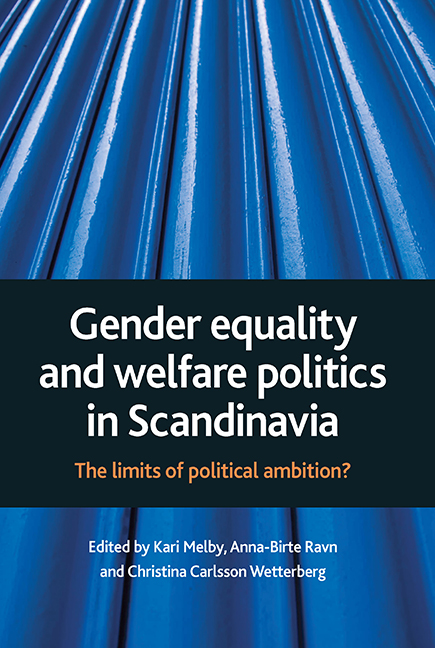Book contents
- Frontmatter
- Contents
- List of tables
- Preface
- Notes on contributors
- A Nordic model of gender equality? Introduction
- Part One Meanings of gender equality in Scandinavian welfare policy
- Part Two Current challenges: competing discourses on gender equality
- Postscript Gender, citizenship and social justice in the Nordic welfare states: a view from the outside
- Postscript Future research on gender equality in the Scandinavian countries
- Appendix Tables 1-10
- Index
nine - Women friendly? Understanding gendered racism in Sweden
Published online by Cambridge University Press: 21 January 2022
- Frontmatter
- Contents
- List of tables
- Preface
- Notes on contributors
- A Nordic model of gender equality? Introduction
- Part One Meanings of gender equality in Scandinavian welfare policy
- Part Two Current challenges: competing discourses on gender equality
- Postscript Gender, citizenship and social justice in the Nordic welfare states: a view from the outside
- Postscript Future research on gender equality in the Scandinavian countries
- Appendix Tables 1-10
- Index
Summary
Introduction
This chapter offers a re-reading of the Swedish welfare state based on everyday experiences of women from the Latin American diaspora (Sawyer, 2000; Alinia, 2004) living in Sweden. Central to the chapter is to explore the specific experience of a group of migrant women at the crossroads between their transnational communities and the public policies of the Swedish welfare state.
Hegemonic trends in Swedish gender studies primarily focus on the conditions of women conceptualised as belonging to the nation. An under-theorisation of gendered racism(s) is common in these studies (Mulinari, 2001). The expansion and academic institutionalisation of queer and post-colonial feminism in the late 1980s changed the landscape of Swedish feminism. Studies inspired by intersectional analysis are today at the core of developments in the field.
While few feminist post-colonial studies have been carried out in Sweden, the dominant strands of research continue to represent migrant women as ‘different’, ‘passive’, ‘traditional’, lacking democratic traditions and with backgrounds in ‘patriarchal’ cultures. The chapter takes its theoretical point of departure from both international and Swedish debates on intersectionality (Collins, 1998; de los Reyes and Mulinari, 2004) and aims to grasp the diversity of migrant women's experience of the Swedish welfare state.
Theoretical starting points
Recognition of the narrow and problematic understanding of the world that is embodied in the word ‘immigrant’ has evolved over the last few years (Brah, 1996; Räthzel, 1997). Recent studies in the field of social policy have highlighted the significance of ‘race’/ethnicity, especially the central role that the welfare state and its institutions play in creating and reproducing specific categories of people (Clark, 2004).
Sweden is today the EU country with the highest proportion of migrants in relation to total population (16% of 9 million when citizens with ‘migrant background’ born in Sweden are included). Castles and Miller (1993) classify Sweden in their analysis of migration regimes together with Australia and Canada with a migration system of permanent settlement, where immigrants are formally granted access to social rights. The concept of subordinated inclusion grasps the specificities of this regime, grounded in the establishment and development of a racialised and gendered working class, where racialised groups are included, but placed in subordinated positions in all spheres of life (Ålund and Schierup, 1991; Mulinari and Neergaard, 2004).
- Type
- Chapter
- Information
- Gender Equality and Welfare Politics in ScandinaviaThe Limits of Political Ambition?, pp. 167 - 182Publisher: Bristol University PressPrint publication year: 2008
- 5
- Cited by



